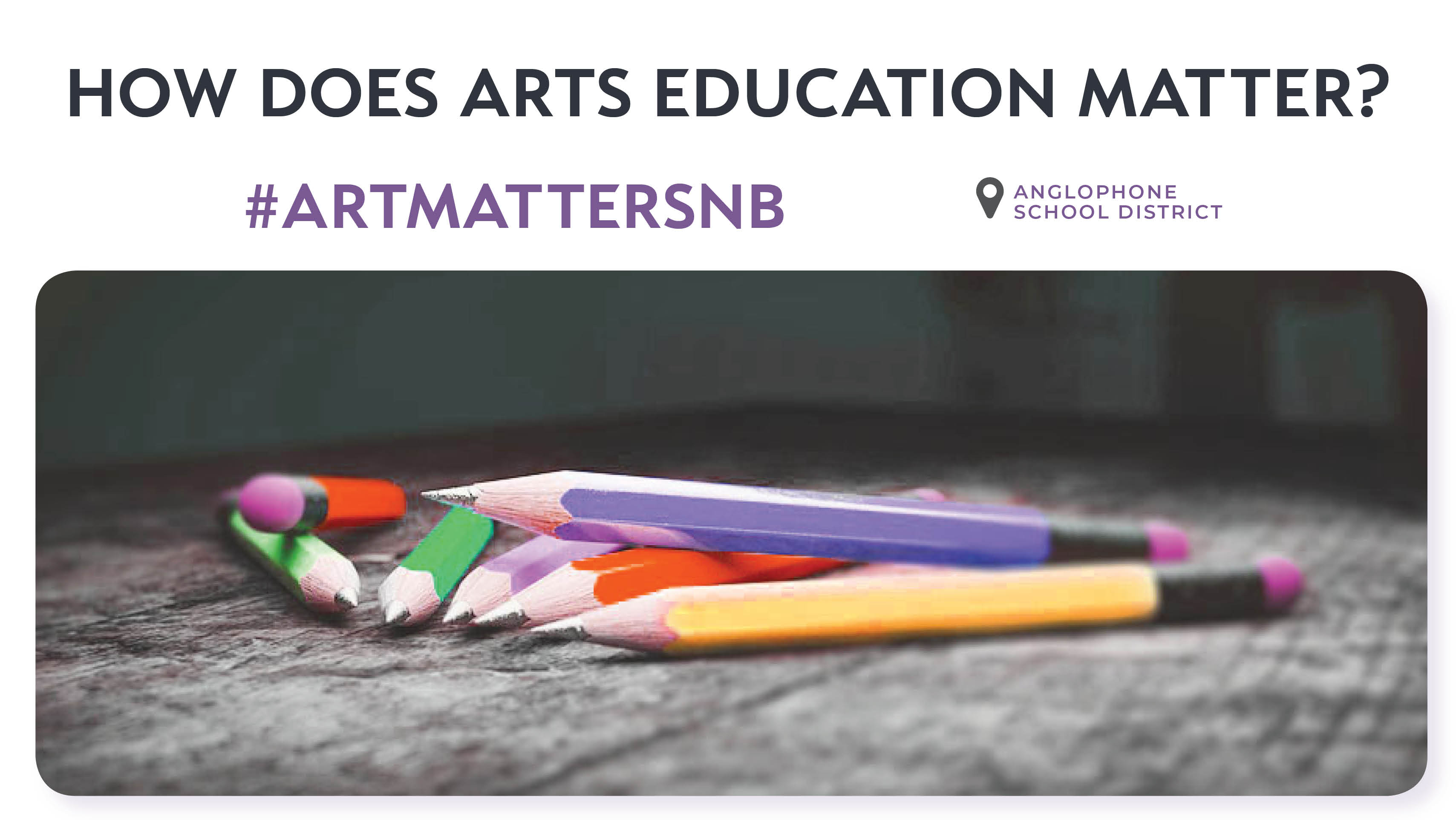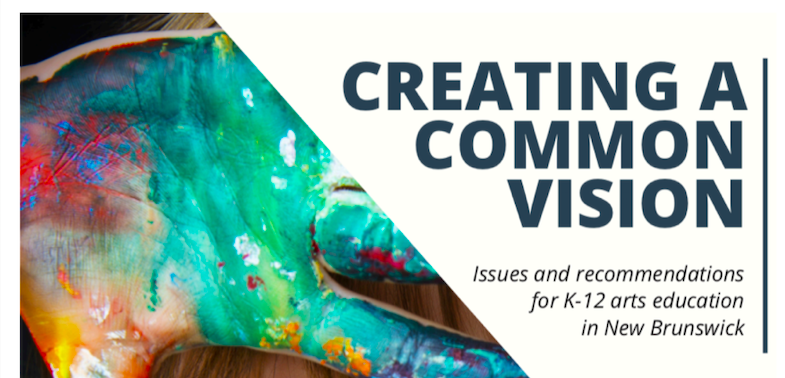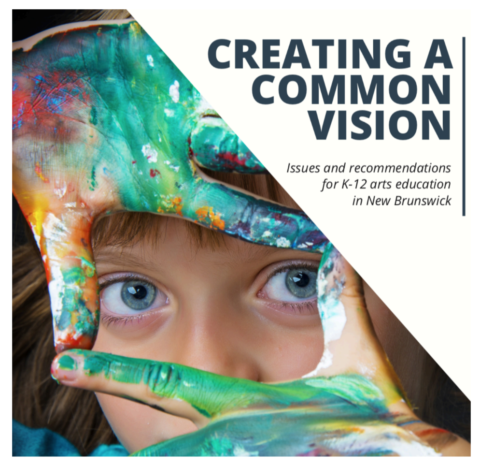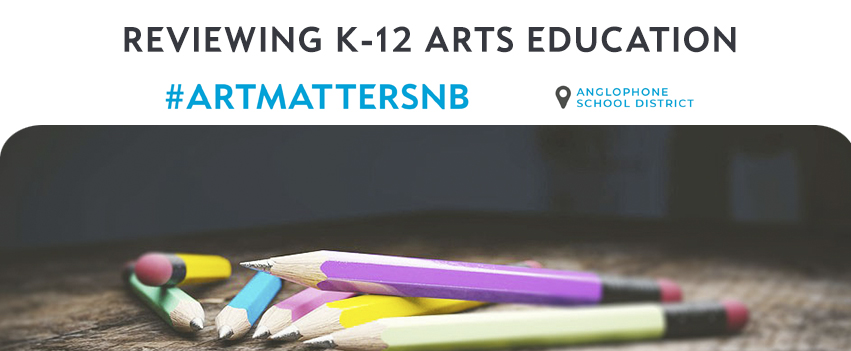ARTS EDUCATION TO BE AMELIORATED ACROSS PROVINCE
Anglophone arts sector organization ArtsLink NB releases report on the status of arts education in New Brunswick and recommendations for improvement to match success of Francophone system.
SAINT JOHN, N.B. MARCH 6, 2019 – ArtsLink NB has commissioned a review of the current state of K-12 arts education in the province. Presented to and supported by the Ministers of Education, and Tourism, Heritage, and Culture, the report is the first phase of an extensive advocacy campaign for expanding arts education in New Brunswick schools. Phase two includes a pilot project to increase students’ exposure and accessibility to the cultural sector by facilitating field trips for classes to see the behind-the-scenes and career opportunities of theatres across the province.
This project builds on recommendations from David Campbell’s report, Sustaining New Brunswick’s Arts and Culture Workforce, as well as the province’s cultural policy, Creative Futures, and the Department of Education and Early Childhood Development’s 10-year education plan, Everyone at their Best. Recommendations presented in ArtsLink NB’s report are meticulously crafted based on feedback gathered by surveying educators, parents, and the general public on the current state of arts education in New Brunswick schools, and were recommended founded on their realistic viability. This report is intended to contribute to a broader province-wide dialogue on enhancing arts education in the K-12 system.
Available in both print and online publication CREATING A COMMON VISION: Issues and recommendations for K-12 arts education in New Brunswick, is meant to propel our province’s students towards a successful future. “Arts education develops skills such as critical and divergent thinking, analytical ability, risk-taking, resilience, empathy, problem-solving, and communication”, states Project Chair, professor, and Head of Fine Arts Department at Mount Allison University, Erik Edson, “These skills will best position students entering any occupation to innovate and thrive in an unpredictable, rapidly changing economy.”
Ensuring that arts education is integral to K – 12 schools and not merely an add-on would be beneficial not only in helping children reach their full potential, but also the potential of New Brunswick’s thriving arts and culture community.
PRESS :
CLICK FOR OVERVIEW DOCUMENT
CLICK FOR MORE INFORMATION
PAST PROGRAMMING // PRELIMINARY PHASES:
 One and All – Parents, educators, artists, students, and all interested community members: Join us at the town hall in your district for a dynamic presentation on arts education!
One and All – Parents, educators, artists, students, and all interested community members: Join us at the town hall in your district for a dynamic presentation on arts education!
How does Arts Education matter? Here is what you told us, and what we are doing about it.
The Arts Education town halls are part of a review of Anglophone arts education being led by ArtsLink NB as an important element in the realization of the province’s Cultural Policy. Participants will hear our report on the state of arts education in New Brunswick and the impact it has on their children, their students, or themselves. Following this, our recommendations for the improvement and future of arts education in our province.
Everyone with an interest in how arts education can support the development of New Brunswick’s students and contribute long-term to the economic and social prosperity of the province is encouraged to attend.
The town halls will be held from 6-8 p.m. on:
– Monday October 22nd at the Saint John Theatre Company in Saint John
– Tuesday October 23rd at The Ville in Fredericton
– Wednesday October 24th in the Aberdeen Cultural Centre in Moncton
– Thursday October 25th at the Anglophone School District North Office in Miramichi
Stay up to date with our Facebook events: Saint John. Fredericton. Moncton. Miramichi. Remember to invite friends!
Welcome to the Arts Education Project! You are part of a province-wide effort to investigate and advise on access to arts education in the Anglophone K-12 school system.
WE ARE ADDRESSING THESE POINTS FROM THE GOVERNMENT OF NB’S 10 YR EDUCATION PLAN EVERYONE AT THEIR BEST:
1: “Improve literacy skills for all learners.”
Media literacy is vital in the modern world; it is the difference between knowing what is an advertisement or fake news versus credible, dependable information. Young people are subject to thousands of images and bits information on a daily basis, but are rarely equipped with the skills needed to negotiate the validity of what is being represented. Through developing an understanding in their arts education courses of how images and patterns are constructed, what and how they communicate, and what value systems they promote / sell, students can develop visual and media literacies.
2:“Foster leadership, active citizenship and an entrepreneurial mindset.”
Studies in theatre, music, and dance can provide students with opportunities for directing, collaborating, advocacy, and entrepreneurship. The heart of entrepreneurship is creative problem solving: imagining a solution that doesn’t already exist to fix a current problem; the ability to imagine is a skill fostered in learning through the arts. Branding and selling are both increasingly dependent on storytelling and compelling leadership. Knowing how to create a narrative, a skill learned through the arts, is integral to the success of business in a contemporary landscape.
3: “Ensure all learners value diversity and have a strong sense of belonging.”
Accessing and participating in making the arts help us to see ourselves in our world, something essential to retaining our youth and attracting newcomers. Participation in the arts can enhance students’ sense of personal worth and accomplishment as well as of membership in a community. Appreciation of shared stories and representations can enhance a sense of identity; and the imaginative leaps, identification, empathy, and re-positionings required to create art projects can assist in the development of what psychologists call “theory of mind,” an essential building-block for understanding, appreciating, and supporting diversity.
4:“Ensure all learners develop the knowledge, skills and behaviours needed to continually adapt to, and thrive in, their environment.”
The arts teach creative problem-solving. Whether the project is making a painting, designing a stage set, playing a musical work, choreographing or executing a dance, or acting a dramatic role, students involved in arts projects are constantly asked to review and revise, adapting to changes or unforeseen developments in media, physical space, instruments, and their co-performers.
These talking points and policy objectives are near and dear to everyone involved in the arts education project, but they also resonate with our friends and colleagues who may not realize how important the arts are to the long-term success of our youth.







